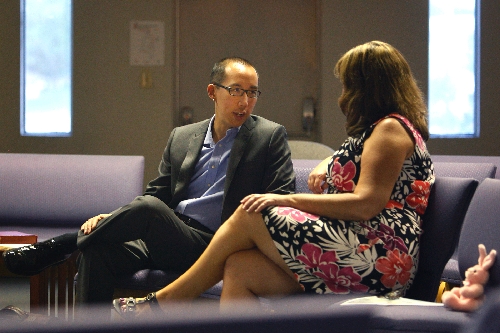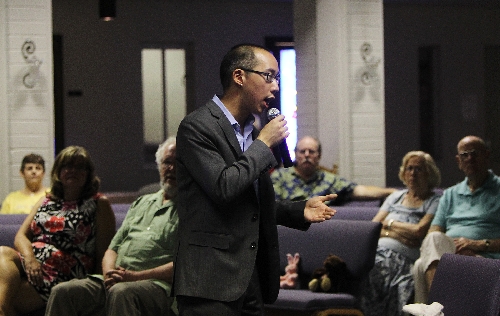Community organizer works to help people link across faiths
Anybody whose idea of "community organizer" harks back to a jeans-and-plaid-shirt paradigm circa 1968 would find Robert Hoo to be ... well, surprising.
Dressed in a sharp, gray suit, he's a sartorial standout among the community leaders gathered at the Islamic Society of Nevada for a casual lunch and an intense presentation about sex trafficking in the Las Vegas Valley.
As the nonprofit Nevadans for the Common Good's first full-time organizer - and its only paid employee - Hoo's primary job is to meet with members of area faith communities, teach them how to forge connections with one another, and then guide them in how to work together to attack social ills that plague the valley.
Nevadans for the Common Good was unveiled in May during a community convention at the University of Nevada, Las Vegas that drew about 1,500 members of local faith communities and nonprofit agencies. Its current areas of focus include battling human trafficking, and particularly child sex trafficking; assisting the vulnerable elderly; fighting neighborhood blight; more effectively integrating immigrant families into the community; and addressing issues related to education and schools.
Hoo arrived in Southern Nevada in July to begin his work here after having spent about seven years doing similar work in Los Angeles. What did he find here?
"People are excited," Hoo answers. "People want to build relationships with one another, identify issues, work together and build this organization together to really make a difference in the valley."
Hoo, a boyish-looking 36, seems OK with talking about himself but really would rather listen to other people talk about themselves. He has a wry sense of humor. Asked about his expectations of Las Vegas, Hoo says, "I expected it to be hot, and it has exceeded all expectations." And he exhibits an easygoing, calm demeanor.
That last trait is something the Rev. Camille Pentsil, senior pastor of Zion United Methodist Church, picked up on during Hoo's job interview with Nevadans for the Common Good board members.
"Robert is very calm and collected and cool, and this is not a very calm and collected and cool place," Pentsil jokes. "And we could use a little bit of calm and collected and cool in Las Vegas."
As Nevadans for the Common Good's lead organizer, Hoo encourages people to tell their stories as a way to learn about each other and, then, he says, "finding common ground because you realize you do have some commonalties." So, it's fitting that Hoo's decision to become a community organizer owes much to his own family's story.
Hoo was born in Port Chester, N.Y., but both his mother and father were born in China. "Both of their families fled China during and after the Communist Revolution. So, I grew up hearing those stories," he says.
His fraternal grandfather, knowing that "a dangerous time" was coming, chose to flee China. But, Hoo says, six of the grandfather's siblings stayed behind and weren't able to get out of China.
"One was executed, one died in prison, one committed suicide, one was persecuted the rest of his life and two disappeared," Hoo says. "No one knows what happened to them.
"And it's not because they were anybody special. They were just regular people, and every family who lived through that time period has those sorts of stories."
Then, on his mother's side of the family, Hoo's grandfather was sent to a labor re-education camp because he had attended college in the United States.
"There were Christians who sponsored him and sent him to college in the United States, so that made him suspect and he had to be re-educated. So when he came out, they left," Hoo says. "They were refugees from Communism, too."
It wasn't until his teens that Hoo realized that the privileges he enjoyed in the United States - being raised in a middle-class household , getting ready to start college, living in a democracy - were "a gift that came from the sacrifices of people who came before me."
He also came to realize that, as the recipient of that gift, "it's also a responsibility I have to live up to and do my part (for), and that democracy cannot survive without the engagement of its citizens."
"That's really what Nevadans for the Common Good is about," Hoo says. "It's saying we're ready to meet the challenge of engaging in public life, of being citizens and acting for the common good, and we know it's not going to happen without us."
When he was 19 and an undergraduate at Yale University, Hoo began doing community work with at-risk youth in New Haven, Conn. His mother was dying of cancer and working with urban youth became an outlet for him, he says.
"I really thought it was really important and vital work," Hoo says. "The work being done in the community - trying to make a difference, building relationships with children and families - felt rally vital. That's where I first got the sense that there are people - clergy, teachers, social workers - who were making a career out of this type of work."
Hoo eventually would earn a law degree from Yale.
"Technically, I'm a lawyer," he says; then, smiling, he adds, "I'm a recovering lawyer."
But he decided to direct his career toward community organizing.
"I'd say one satisfaction that I get is, I get to meet amazing people every day - clergy, lay leaders, principals, parents, academics," Hoo says. "They're all doing amazing things, and they all want to be part of something like Nevadans for the Common Good and take something they're doing at the local level and connect with other people."
Valley faith leaders laid the groundwork for Nevadans for the Common Good over several years. Hoo was hired as its first lead organizer.
"Robert's name was mentioned," says the Rev. Dennis Hutson, pastor of Advent United Methodist Church. "We interviewed him and our board felt that he was a good fit."
The position represented "just a very exciting opportunity to be able to come to Las Vegas, which is a fascinating, diverse, growing area - or had been until recently," Hoo says.
"Every place is a unique situation, and one thing I have noticed about Las Vegas that people talk about is the level of isolation and lack of connectedness and absence of community. Part of that is the transience - that very few people are from here and come out only expecting to be here for a few years."
The potential consequences of such a short-term mindset is that residents may not truly put down roots, may not vote and may not even go to a faith congregation, Hoo says.
It also could be a function of Las Vegas still being a relatively young city.
"There really aren't necessarily the networks and collaborations you might find in a more established community, and that presents challenges," Hoo says.
"On the other hand, we can see that people are thirsting for that sense of connection. We saw that May 22 (at the community convention at UNLV), when 1,500 people came together and had this appetite to come together and build relationships."
Hoo has spent the past three months acquainting himself with Southern Nevada and its residents and meeting with valley clergy, members of local faith communities, representatives of nonprofit agencies and community leaders. What did he expect to find here when he arrived?
"I expected that (Southern Nevada) was going to be much more diverse and complex than the Strip, and it clearly is. It's clearly much bigger and more interesting, and much more dynamic," Hoo says.
"And I expected there would be people who were passionate and wanted to do something, and who wanted to build an organization, and it has exceeded expectations in that respect. I think the level of enthusiasm, the level of ownership, far exceeds what I expected."
Although Nevadans for the Common Good includes faith groups among its members, it's not a religious organization. Hoo says. Nor is it a partisan political organization.
"It doesn't matter to us if you're a Democrat or a Republican or any other party," Hoo says. "This is a nonpartisan effort about how we can transcend our differences and act for the common good."'
Hutson agrees.
"Our concern is to make our human condition better - period," he says.
Toward that end, Hoo says the goal is to create an infrastructure that "will be sustainable for 20, 30, 40, 50 years that is built around relationships as opposed to specific issues."
That's necessary because sometimes a problem morphs into another problem, Hoo explains.
"That doesn't mean you didn't make any progress. It just means the world is never perfect," Hoo says. "You address one thing and there are consequences flowing from that, and then you've got to deal with the other consequences. So you need a sustainable organization (to) deal with the evolving nature of those problems."
"I'd like to be here for as long as it takes to build a really strong organization that's going to last," Hoo says.
"After that, I really shouldn't be here forever, because this is not built around any one individual or group of individuals. It's got to be much bigger than that."
Contact reporter John Przybys at jprzybys@reviewjournal.com or 702-383-0280.



















